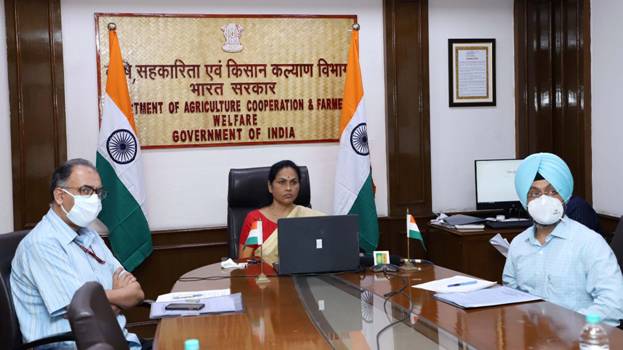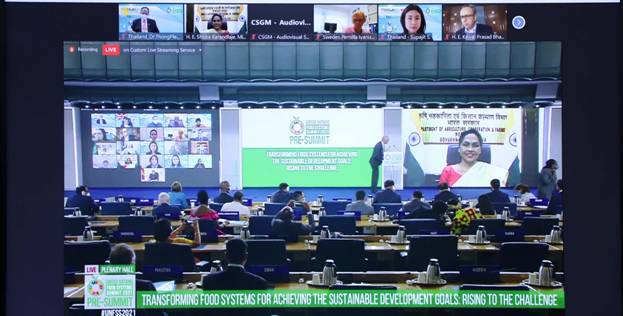Ministry of Agriculture &
Farmers Welfare
Pre-Summit Ministerial Roundtable of United Nations Food Systems Summit held
India catapulted as a food grain exporter from a country with perennial food shortages in the 1960s through the green revolution: Ms. Shobha Karandlaje, MoS Agriculture
The Minister thanks UN and other countries for accepting India's proposal of celebrating year 2023 as the 'International Year of Millets'
प्रविष्टि तिथि:
27 JUL 2021 5:01PM by PIB Delhi
Union Minister of State for Agriculture and Farmer’s Welfare Ms Shobha Karandlaje virtually addressed the Pre-Summit Ministerial Roundtable on “Transforming Food Systems for Achieving the Sustainable Development Goals: Rising to the Challenge” of United Nations Food Systems Summit 2021. She said "the UN Food Systems Summit has given us a lead to define the national pathways to transform our Food Systems into economically, socially and environmentally sustainable systems. The Minister informed the summit about various steps India has taken to transform its agri-food systems into sustainable systems, to provide income support to farmers, improve rural incomes, as well as address the issues of under-nutrition and malnutrition in the country."

Emphasizing the importance of the agriculture sector Ms. Karandlaje said that India has a strong conviction that agriculture has to play a vital role in socio-economic transformation in developing countries and in securing a sustainable future for the planet. She said that Agriculture has been a great success story in India. The green revolution in the 1960s catapulted India from a country with perennial food shortages to a food grain exporter as of today.
Speaking on priorities set by India for the agriculture sector the Minister said that the Government of India under the leadership of Prime Minister Shri Narendra Modi has always been very sensitive to the issues faced by the farmers and has taken various proactive initiatives to address each problem faced by them. India is now focusing to enhance productivity, make post-harvest management robust and give farmers and buyers a unified national market for optimizing benefits to both.
Ms. Karandlaje said India has embarked on very ambitious reforms in the agriculture sector to double the income of farmers in coming years and numerous interventions have been put in place in recent times due to which India's farm sector performed exceedingly well even in the pandemic crisis with production surpassing earlier records. The Government of India has created a dedicated Agriculture Infrastructure Fund worth USD 14 billion which aims to create farm gate and agriculture marketing infrastructure in rural areas by providing interest subventions and credit guarantee to entrepreneurs which will greatly help in reducing the post-harvest losses thereby directly benefiting the farmers.
The Minister thanked the UN and other countries for accepting India's proposal of celebrating the year 2023 as the 'International Year of Millets'. She said that for addressing nutritional challenges and also to bring diversity in our agri-food systems, the Government is supporting diversification from predominantly food grain-based systems to other high-value crops like fruits and vegetables.

Speaking on the various reforms by India, the Minister said the Government has launched a scheme for the formation and promotion of Farmer Producers Organizations to provide scale advantage to small and marginal farmers. The agricultural marketing reforms have been undertaken which removed barriers to the interstate marketing of agricultural produce. An amount of about 18 billion US Dollars has been credited to the bank accounts of 110 million farmers under the PM KISAN Scheme. India is running the National Rural Employment Guarantee Scheme that provides a constitutional right to every rural household to work for 100 days a year on a voluntary basis.
The Minister said India is actively promoting organic farming for ensuring sustainable productivity, food security and soil health. To conserve precious water resources, India has launched a scheme to increase water use efficiency at the farm level by using micro-irrigation technologies for which a dedicated micro-irrigation fund of US $ 672 million has been set up. India has developed 262 abiotic stress-tolerant varieties of different crops.
To address the issues of under-nutrition and malnutrition, India is running the world’s largest food-based safety net programmes which include the Targeted Public Distribution System (TPDS) that served about 800 million people in 2020. India's school feeding program, the Mid Day Meal Scheme reached about 120 million schoolchildren.
The Minister assured the summit that India will continue with its efforts in transforming our agri-food systems into sustainable systems and to achieve the targets set in the Sustainable Development Goals 2030.
*****
APS/JK
(रिलीज़ आईडी: 1739509)
आगंतुक पटल : 1623